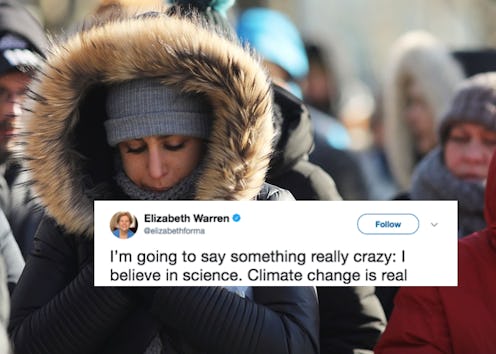News
Trump Thinks Global Warming Can Protect You From This Freezing Weather

In a move that would make any scientist or person who believes in scientific fact facepalm, President Donald Trump managed to simultaneously promote global warming and show he doesn't know the difference between climate and weather. In a tweet on Thursday night, Trump suggested global warming could solve cold weather. Climate change, according to Trump, is the perfect cure to your winter blues and this frigid weather ruining your New Year's Eve plans. Praising "good old global warming," Trump's exact words were:
In the East, it could be the COLDEST New Year’s Eve on record. Perhaps we could use a little bit of that good old Global Warming that our Country, but not other countries, was going to pay TRILLIONS OF DOLLARS to protect against. Bundle up!
What Trump doesn't seem to recognize when pointing out this cold spell is that from California up to Alaska, the West Coast is having an unusually warm winter. In Alaska, rivers that would normally be frozen this time of year haven't frozen yet, and the state is on track to having its warmest winter on record. And back on the East Coast, D.C. actually came out of its warmest autumn in 144 years.
This isn't the first time Trump has taken to Twitter to express his enthusiasm for or denial of climate change, which incidentally could be one of the main forces driving extreme weather patterns. Earlier in December he pointed to a brief cold snap in Los Angeles as proof that "global warming is a total, and very expensive, hoax!"
But this time, Sen. Elizabeth Warren (D-MA) has decided to clap back with the crazy idea that 97 percent of published climate scientists are probably correct.
Meteorologist Eric Holthaus also responded with a quick primer on what climate and weather are. Turns out, they're not the same thing:
To sum it up, weather refers to atmospheric conditions at a specific time and place — for example: 2004's White Christmas in Houston, Texas. Climate refers to trends in a region over a long period of time — for example: 2016 was the second warmest year in the United States on record. That's why it's problematic to claim the planet can't be heating up just because you look out your window one morning and it looks like Snowmageddon. On that same logic, you also can't claim climate change "caused" Hurricane Harvey.
But looking at the big picture, trends (such as global warming from human activity) can cause side effects (such as melting ice caps leading to rising sea levels) that can cause changes in long-term weather patterns. That means global warming can contribute to the likelihood and severity of weather events in say, a period of 30 years (such as an increase in intense drought, wildfires exacerbated by dry winds, and yes, even epic blizzards). As "Earth warms, powerful storms are becoming the new normal," warns the Union of Concerned Scientists.
And while the winter haters out there might think warmer weather means better weather, the big picture shows a global reckoning. "We've built our civilization on the assumption that climate is stable," says climate scientist Katharine Hayhoe in her video series Global Weirding.
In 2016 National Geographic reported on the first official climate refugees in the United States, a Native American tribe in the Louisiana bayou whose land is slipping away into the Gulf of Mexico. But as experts warn, climate change is a global problem that could displace tens of millions of people, resulting in the world's biggest refugee crisis.
Trump has tweeted his skepticism about climate change more than a hundred times. This dangerous anti-science rhetoric buoys the Trump administration's efforts to block pragmatic problem-solving or even discussion about climate change. Without federal support, it might be up to states and cities to address global warming.